北师大版选修6Unit 16 Stories复习课件(共69张PPT)
文档属性
| 名称 | 北师大版选修6Unit 16 Stories复习课件(共69张PPT) |
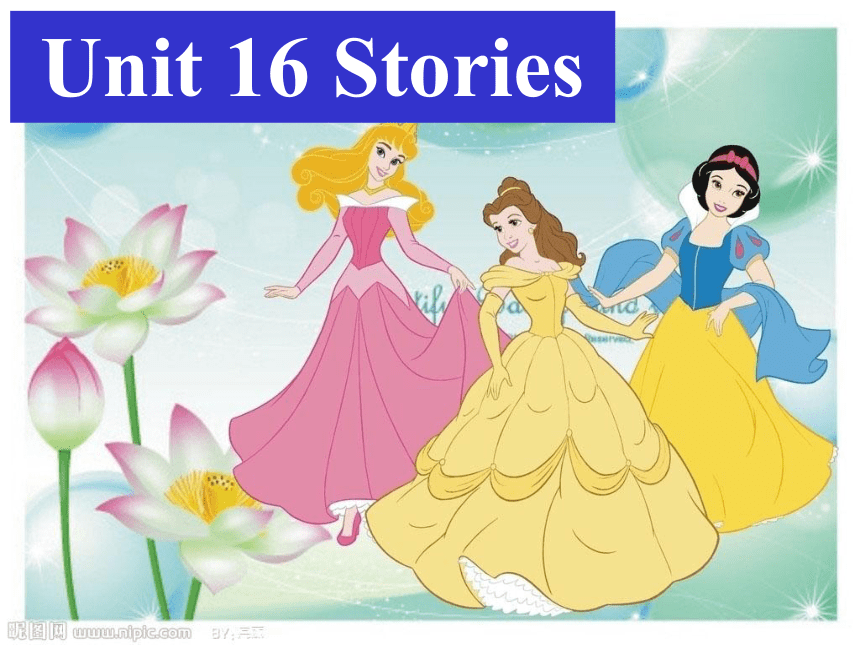
|
|
| 格式 | zip | ||
| 文件大小 | 275.3KB | ||
| 资源类型 | 教案 | ||
| 版本资源 | 北师大版 | ||
| 科目 | 英语 | ||
| 更新时间 | 2019-01-21 10:26:38 | ||
图片预览



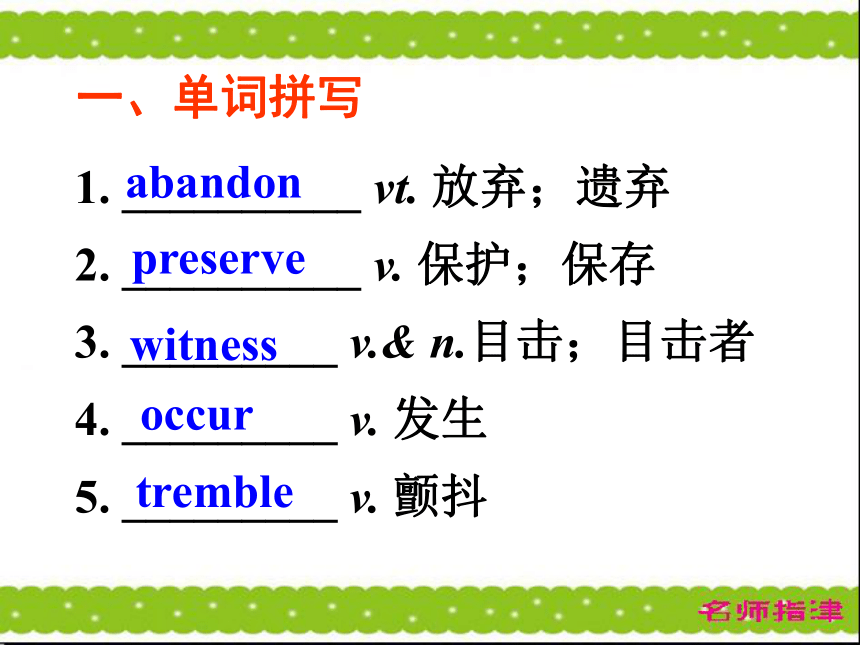
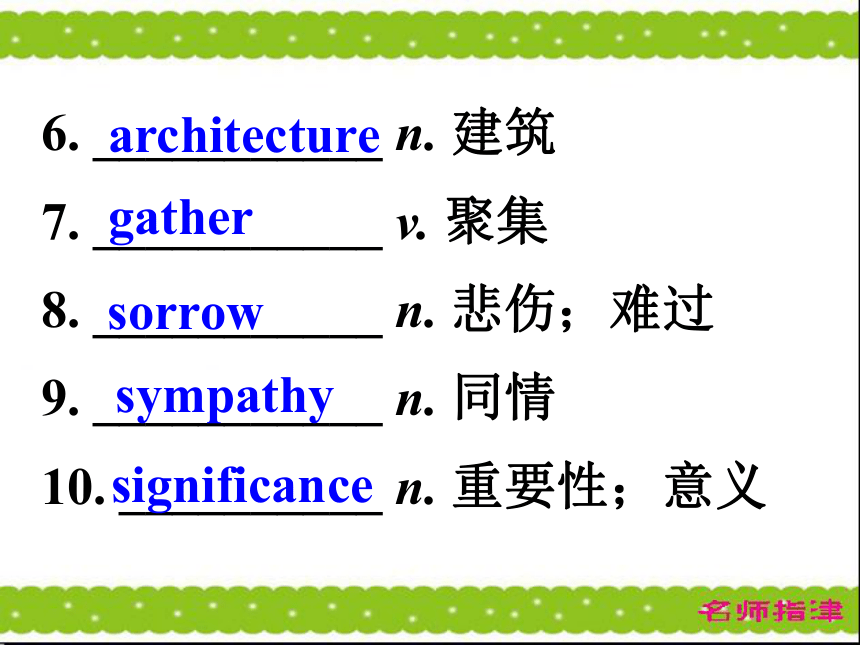
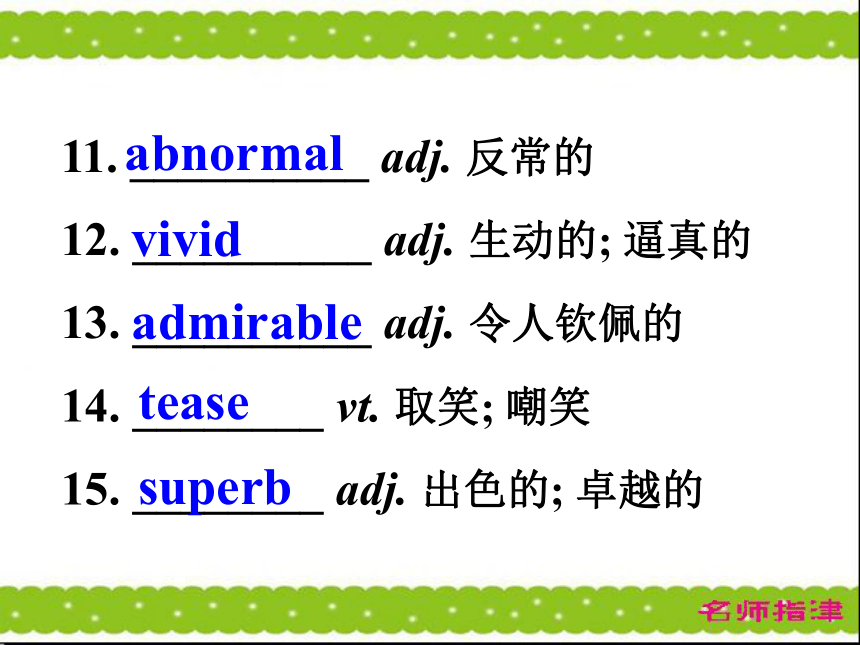
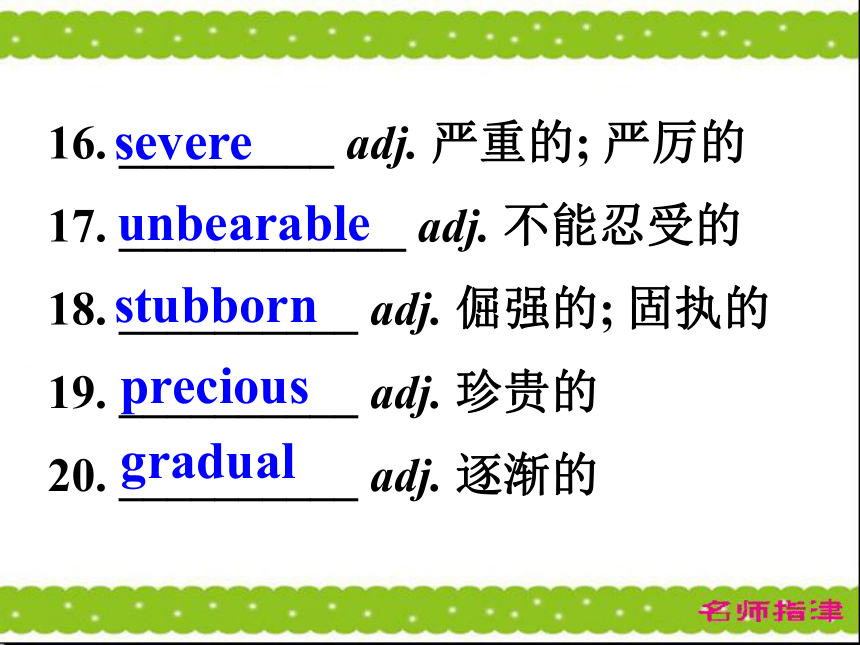
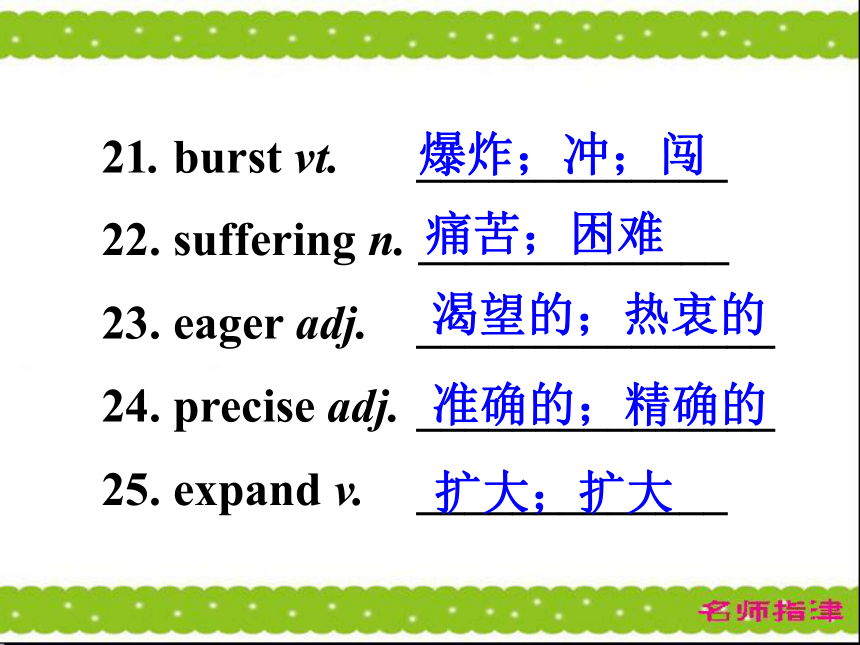
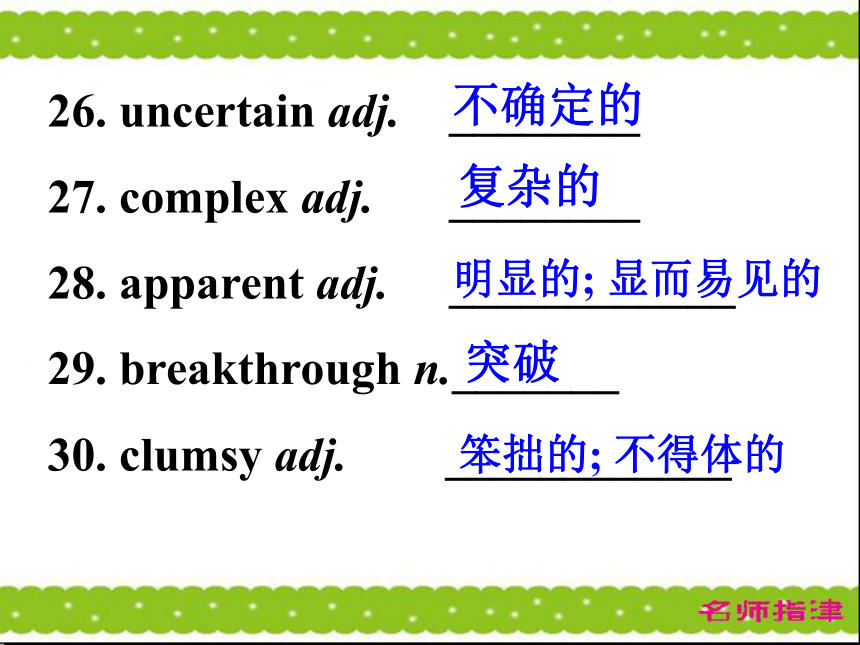
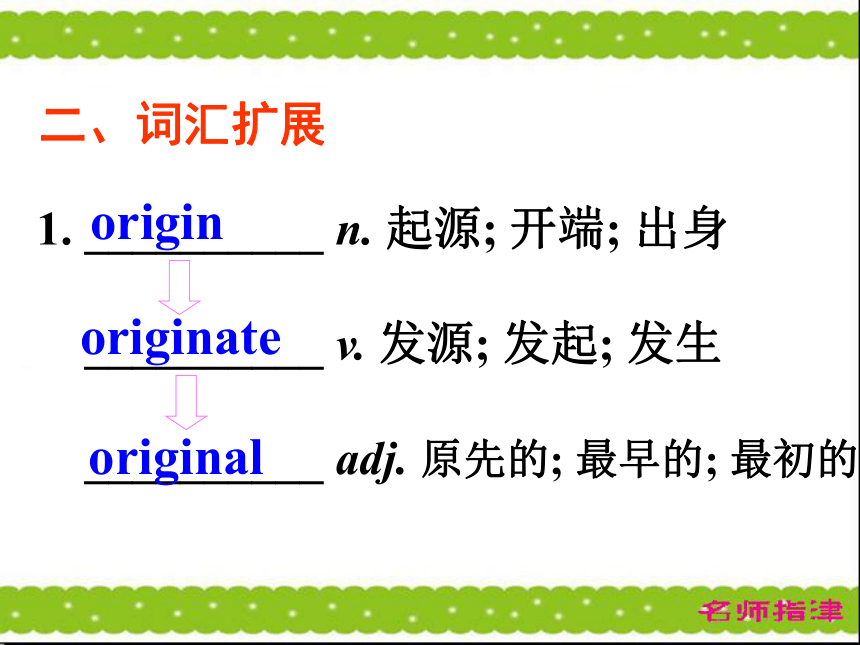
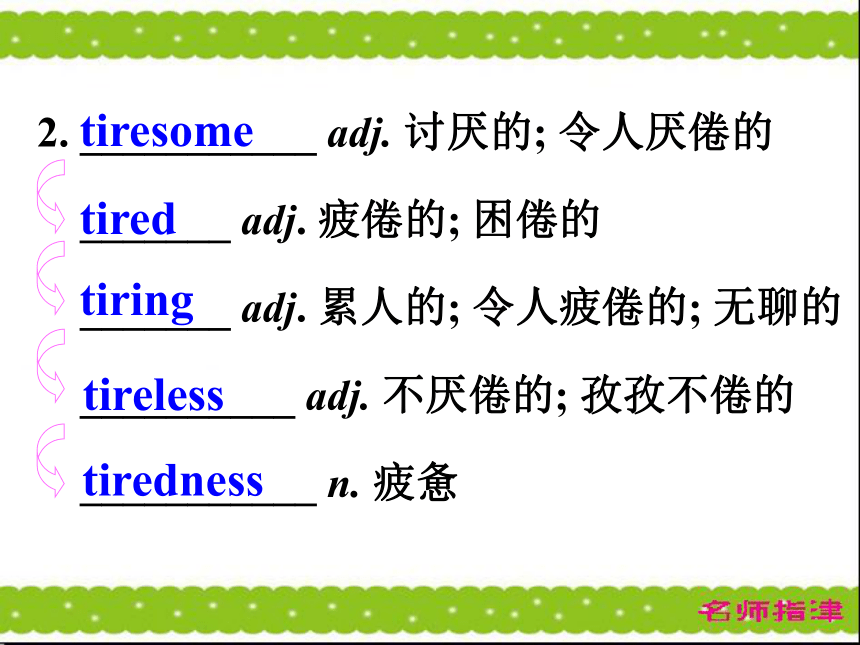
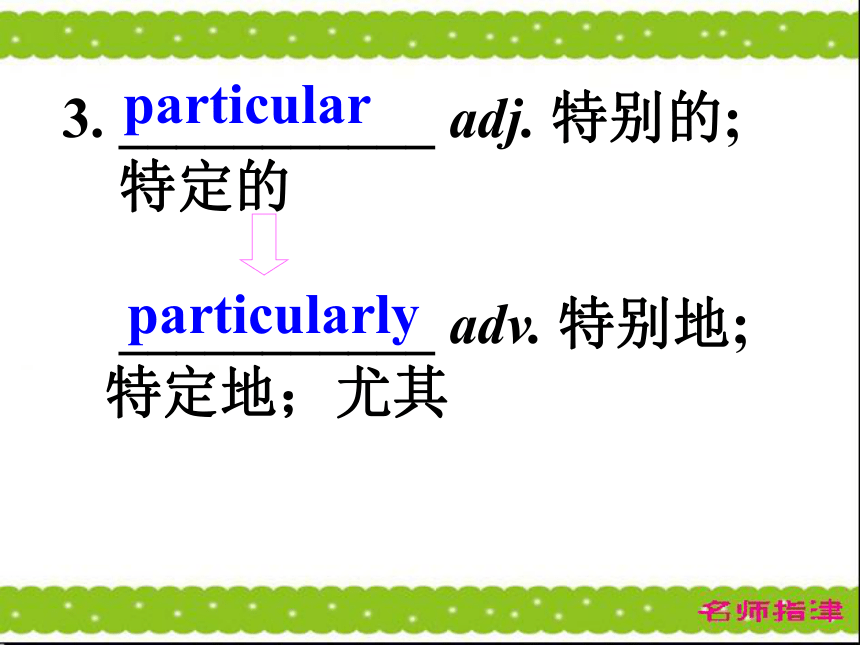
文档简介
课件69张PPT。 Unit 16 Stories 基础知识自主测试重点词汇边讲边练写作句型熟读仿写 基础知识自主测试 1. __________ vt. 放弃;遗弃
2. __________ v. 保护;保存
3. _________ v.& n.目击;目击者
4. _________ v. 发生
5. _________ v. 颤抖tremble abandonpreservewitnessoccur一、单词拼写 6. ___________ n. 建筑
7. ___________ v. 聚集
8. ___________ n. 悲伤;难过
9. ___________ n. 同情
10. __________ n. 重要性;意义significance architecturegather sorrowsympathy11. __________ adj. 反常的
12. __________ adj. 生动的; 逼真的
13. __________ adj. 令人钦佩的
14. ________ vt. 取笑; 嘲笑
15. ________ adj. 出色的; 卓越的 superb abnormalvividadmirabletease16. _________ adj. 严重的; 严厉的
17. ____________ adj. 不能忍受的
18. __________ adj. 倔强的; 固执的
19. __________ adj. 珍贵的
20. __________ adj. 逐渐的gradual severeunbearablestubbornprecious21. burst vt. _____________
22. suffering n. _____________
23. eager adj. _______________
24. precise adj. _______________
25. expand v. _____________爆炸;冲;闯痛苦;困难渴望的;热衷的准确的;精确的扩大;扩大 26. uncertain adj. ________
27. complex adj. ________
28. apparent adj. ____________
29. breakthrough n._______
30. clumsy adj. ____________笨拙的; 不得体的不确定的复杂的明显的; 显而易见的突破1. __________ n. 起源; 开端; 出身
__________ v. 发源; 发起; 发生
__________ adj. 原先的; 最早的; 最初的original originoriginate二、词汇扩展2. ___________ adj. 讨厌的; 令人厌倦的
_______ adj. 疲倦的; 困倦的
_______ adj. 累人的; 令人疲倦的; 无聊的
__________ adj. 不厌倦的; 孜孜不倦的
___________ n. 疲惫tirednesstiresometiredtiring tireless3. ___________ adj. 特别的;
特定的
___________ adv. 特别地;
特定地;尤其 particularlyparticular4. _____________ vt. 赠送; 颁发; 出席
n. 现在; 目前; 报告
adj. 到场的;现在的
_____________ n. 介绍; 呈现; 演出
_____________ n. 出席; 在场presencepresentpresentation5. ______________ vt. 使泄气; 使灰心
______________ adj. 感到气馁的
______________ adj. 使人气馁
_________________ n. 气馁; 挫折discouragementdiscouragediscourageddiscouraging1. I don’t know the real ________ reason of the quarrel. Maybe it __________ from misunderstanding. (origin)originaloriginated三、单句填空第一个空作定语用形容词;originated作谓语,originate from是固定搭配,意思是“起源于”。2. We were _____ of his speech. His _______ speech made us sleepy. But he seemed to be _______ and talked on and on. (tired)短语be tired of 是固定搭配;tiring作定语,修饰名词;tireless作表语,意思是“不知疲倦的”。tiredtiringtireless3. He is __________ clever in our class. He is good at science subjects in __________. (particular)第一个空是副词修饰形容词clever;in particular是固定搭配,意思是“尤其”。particularlyparticular4. He __________ a box of chocolate to his wife as a _______. (present)第一个空作谓语, 意思是“赠送”; present名词作宾语。presentedpresent5. The weather was ______________. We were ____________ from climbing that mountain. (discourage)第一个空作表语用形容词;第二空 be discouraged from doing sth.是固定搭配,意思是“被阻止做某事”。discouragingdiscouraged1. _________________ 撞倒某人
2. ____________ 挖出
3. ____________ 堵住
4. ____________________ 给…留下深刻印象
5. ____________ 解散 split up knock sb. overdig outblock outleave a deep impression on四、短语互译6. ________________ 在去……的路上
7. ________________ 以……命名
8. ________________ 成长
9. ________________ 使某人回想起
10. _______________ 偶然遇见come across on the way toname aftergrow upremind sb. of11. _______________ 以……结束
12. _______________忍受;容忍
13. in a way _______________
14. relate to sb. _________
15. in a flash _________一瞬间 end upput up with在某种程度上了解,体恤某人16. for ages _________
17. now that+句子 ______
18. hold sb. up ___________
19. figure out sth. ________
20. count on sb. _______依靠很长时间既然举起;搭起弄清楚五、课文填空 Around the end of the first century AD, a Roman writer 1 _________ (call) Pliny wrote about a terrible volcanic eruption that he had witnessed as a young man. The eruption had occurred on August 24th, 79 AD. The earth began to tremble and a volcano named Vesuvius, near Pompeii, Italy, erupted. Pliny described a cloud coming down the mountain, blocking out the sun and 2 ___________(bury)everything in its path, including whole village and towns. burying called This 3 ____________ (particular) sad event left a deep impression on Pliny who had lost an uncle in the eruption. Yet, over the centuries, there was a 4 _________ (great) loss. The people, towns and villages 5 _____ had disappeared under the ashes were entirely forgotten by the world.
However, more than 1, 600 years later, some scientists found 6 _____ lost towns that had been buried under the ashes. the that greaterparticularlyBy 1748, they 7 ___________ (find) an awesome
8 ____________ (history)site.They had started to dig out the ancient city of Pompeii.
9 _____ a way, Pompeii is like a “time capsule” preserving a frozen moment in history. Before the eruption occurred, it had been a booming Roman city with temples, markets, 10 ______________ (restaurant) and theaters.restaurantsIn historical had found1. called 过去分词短语作后置定语。
2. burying 因burying与coming, blocking保持一致,cloud与coming, block和bury是主动关系,用现在分词。
3. particularly 修饰形容词要用副词。
4. greater 由下文可知是更大的损失。
5. that 先行词有人也有事物,通常只用that引导定语从句。6. the 特指被埋在灰烬下的城镇。
7. had found 由时间状语By 1748可知用过去完成时。
8. historical 修饰名词用形容词。
9. In 因in a way为固定搭配,意思是“在某种意义上”。
10. restaurants 与前后保持一致。六、短文改错 The day everything did wrong was May 24.
First, I had to waiting 30 minutes for the school
bus. When it did not arrive at, I decided to walk
to school. The day was hot and tired. The next
problem happened when I arrived at school. Mr. Fan, the English teacher, a large but
friendly man, reminded me with his loud
voice that the poetry reading competition,
that I had forgotten, was that afternoon.
There was no time practise, and I read from
my book instead of reciting the poems. I was not surprised when I came last in the
competition. The last problem of this terribly
day happened when I got into bed that night. I
keep a glass of water near the bed, and as I got
into bed they fell over onto my pillow.1. did→ went 比较:do wrong作恶,干坏事;go wrong出问题,不顺利。
2. waiting→ wait 在have to后接动词原形。
3. 去掉arrive后的at 后面没有表示到达某地的名词,不用介词。
4. tired→ tiring 指天气“令人疲劳的”,而不是人“感到疲劳”。
5. with→ in 表示“以”某种声音,用介词in。6. that→ which 引导非限制性定语从句,先行词是事物时,要用which引导。
7. 在practise前加to 表示“没有时间做某事”是there is no time to do sth.。
8. terribly→ terrible 修饰day作定语,要用形容词。
9. keep→ kept 改后才上下文时态一致。
10. they→ it 指the glass of water,用it。 重点词汇边讲边练 1. abandon vt. 抛弃,离弃(desert, leave,
go away from);放弃,停止(stop, give up completely);放纵
用法自测 填入一个适当的词或完成句子。
⑴ The cruel man ___________________ (抛弃了妻子)and went away with all their money. abandoned his wife ⑵ The game had to _____________ (abandon) due to bad weather.
⑶ He abandons himself ____ sorrow because of his grandfather’s sudden death.
⑷ An __________(abandon) baby was found in a box on the hospital steps. abandonedbe abandoned toabandoned adj. 被遗弃的;放荡的
abandon oneself to sth.沉溺于;陷入归纳总结2. significance n. 意义(meaning);重要性(importance)
用法自测 填入一个适当的词或所给词的正确形式。
⑴ I think what they are doing is _____no significance.
⑵ Family plays a ____________(significance) role in shaping children’s character.significantofsignificant adj. 有意义的;重要的
be of great significance很重要(= be significant)
be of no/ little significance不重要归纳总结3. occur vi. 发生(happen or exist);被想起/ 到(come into one’s mind)
用法自测 填入一个适当的词或完成句子。
⑴ ______________(发生冲突) occasionally between the two countries.Conflicts occur ⑵ It occurred ____ me to visit my teacher.
⑶ _______________________(他没有想到) she would refuse his invitation.It didn’t occur to him that tosth. occurs to sb.某人想到某事
it occurs to sb. to do sth. 某人想到做某事
it occurs to sb. that … 某人想到……
说明:occur是不及物动词,不能带宾语,不能用于被动语态,其过去式和过去分词为occurred。归纳总结4. preserve vt. 保护;保存;维持
用法自测 用适当的介词或所给词的适当形式填空。
⑴ It is highly significant _________ (preserve) the environment.to preserve⑵ The paintings were in an excellent state of _____________ (preserve).
⑶ A group of preservationists are making a plan to preserve polar bears _______ extinction.frompreservationpreservation n. 保护;保持;维护
preserve…from sth. 保护……免受……归纳总结5. witness vt. 目击;当场看见
n. 目击者;证人(常接介词to)
用法自测 用介词填空或完成句子。
⑴ Police have appealed for anyone who
____________________ (目击了这次事故) to contact them.
⑵ One witness ____ the accident said the driver appeared to be drunk.towitnessed the accident6. loss n. 损失;丧失;遗失
用法自测 填入一个适当的词或完成句子。
⑴ ________________(失去健康) is more serious than loss of money.Loss of health⑵ Moved by their speech,I was ___ a loss what to say.
⑶ His unfortunate death was a great loss _____ the firm.attolose vt. 丢失
lost adj. 失去的;困惑的
at a loss 茫然;困惑(puzzled)
a great loss to … 是……的一大损失归纳总结7. trouble vt. 麻烦;使烦恼
n. 麻烦;烦扰
用法自测 填入一个适当的词或所给词的正确形式。
⑴ I often turn to my friends for help when I am ____ trouble. in⑵ I had a little trouble __________ (learn) English grammar.
⑶ They took a lot of trouble _______ (find) the right person for the job.
⑷ You will get ______trouble if you park your car here.into(in) learningto findin trouble 处于麻烦/ 困难中
have trouble (in) doing sth. 做某事有困难
take trouble to do sth. 尽心尽力地做某事
get (sb.) into trouble(给某人)惹麻烦
ask for trouble= look for trouble找麻烦归纳总结8. sympathy n. 同情;同情心
用法自测 用适当的介词填空或完成句子。
⑴ I show sympathy ____ you; I also had a similar unhappy experience myself.for⑵ He’s wrong. I have no sympathy ______
him.
⑶ ________________ (出于同情)for the homeless children, he gave them shelter for the night Out of sympathy withsympathize vi. 同情;支持
express/ show/ feel/ have sympathy for sb.同情某人
have sympathy with sb./ sth.同意某人的观点(=agree with)
out of sympathy (for) 出于(对……的)同情归纳总结9. remind sb. of sth. 使某人回想起……
remind sb. that … 提醒某人……
remind sb. to do sth.提醒某人做某事
用法自测 填入一个适当的词或所给词的正确形式。
⑴ This story reminds me ____ my own experience when I was a child. of⑵ Please remind me _______I must call her up before nine.
⑶ Please remind me _________(leave) her this note. to leavethat10. put up with 忍受;容忍(=bear/ stand/ tolerate: accept an unpleasant situation or person without complaining)
用法自测 填入一个适当的词或完成句子。
⑴ I’m not going to put up ______their smoking any longer.
⑵ I can’t ______________(忍受她) another day, as she never stops complaining.put up with herwith 写作句型熟读仿写 1. As Helen’s knowledge and vocabulary expanded, she asked more and more questions.随着知识的增加和词汇量的扩大,海伦问的问题越来越多。
句型 As…随着……(用于句首句未均可) 仿写 根据汉语提示完成下列句子。
⑴随着时间的流逝, 这件事也就渐渐地淡忘了。
This event faded from my memory _____________________________
__________.As time went by (=With time
going by) ⑵随着经济的发展, 环境污染变得越来越严重。
__________________________________________________________ the environmental pollution is more and more serious.As the economy develops (=With the development of the economy)2. It was the first time Helen
had understood such a complex word — a word for something she couldn’t touch. 这是海伦第一次明白这样一个复杂的词 —— 一个她触摸不到的东西的含义。(P11)句型 It is the firs/second time that sb. have done
It was the first/second time that sb. had done
说明 表示“是某人第几次做某事”时,后面由that引导的从句用完成时。仿写 根据汉语提示完成下列句子。
⑴这是我第一次来广州大学参观。
It is the first time that _________ __________________________.
⑵那是我第二次犯同样的错误。
It was the second time that ________ _______________. 3. The day started to go wrong the instant I left home. 那一天,我一离开家就开始不走运。(P12)
句型 the instant ... 一……就……
说明 同义结构还有as soon as, the moment, the minute, immediately等。仿写 根据汉语提示完成下列句子。
⑴我一到站台, 火车就开动了。
___________________________ , the train began to move.The instant I reached the platform⑵我一听到这消息就告诉你了。
I sent you the news __________ _________.
⑶他一进来便把照片给我们看。
____________________, he showed us the picture.The instant he came inThank you!
2. __________ v. 保护;保存
3. _________ v.& n.目击;目击者
4. _________ v. 发生
5. _________ v. 颤抖tremble abandonpreservewitnessoccur一、单词拼写 6. ___________ n. 建筑
7. ___________ v. 聚集
8. ___________ n. 悲伤;难过
9. ___________ n. 同情
10. __________ n. 重要性;意义significance architecturegather sorrowsympathy11. __________ adj. 反常的
12. __________ adj. 生动的; 逼真的
13. __________ adj. 令人钦佩的
14. ________ vt. 取笑; 嘲笑
15. ________ adj. 出色的; 卓越的 superb abnormalvividadmirabletease16. _________ adj. 严重的; 严厉的
17. ____________ adj. 不能忍受的
18. __________ adj. 倔强的; 固执的
19. __________ adj. 珍贵的
20. __________ adj. 逐渐的gradual severeunbearablestubbornprecious21. burst vt. _____________
22. suffering n. _____________
23. eager adj. _______________
24. precise adj. _______________
25. expand v. _____________爆炸;冲;闯痛苦;困难渴望的;热衷的准确的;精确的扩大;扩大 26. uncertain adj. ________
27. complex adj. ________
28. apparent adj. ____________
29. breakthrough n._______
30. clumsy adj. ____________笨拙的; 不得体的不确定的复杂的明显的; 显而易见的突破1. __________ n. 起源; 开端; 出身
__________ v. 发源; 发起; 发生
__________ adj. 原先的; 最早的; 最初的original originoriginate二、词汇扩展2. ___________ adj. 讨厌的; 令人厌倦的
_______ adj. 疲倦的; 困倦的
_______ adj. 累人的; 令人疲倦的; 无聊的
__________ adj. 不厌倦的; 孜孜不倦的
___________ n. 疲惫tirednesstiresometiredtiring tireless3. ___________ adj. 特别的;
特定的
___________ adv. 特别地;
特定地;尤其 particularlyparticular4. _____________ vt. 赠送; 颁发; 出席
n. 现在; 目前; 报告
adj. 到场的;现在的
_____________ n. 介绍; 呈现; 演出
_____________ n. 出席; 在场presencepresentpresentation5. ______________ vt. 使泄气; 使灰心
______________ adj. 感到气馁的
______________ adj. 使人气馁
_________________ n. 气馁; 挫折discouragementdiscouragediscourageddiscouraging1. I don’t know the real ________ reason of the quarrel. Maybe it __________ from misunderstanding. (origin)originaloriginated三、单句填空第一个空作定语用形容词;originated作谓语,originate from是固定搭配,意思是“起源于”。2. We were _____ of his speech. His _______ speech made us sleepy. But he seemed to be _______ and talked on and on. (tired)短语be tired of 是固定搭配;tiring作定语,修饰名词;tireless作表语,意思是“不知疲倦的”。tiredtiringtireless3. He is __________ clever in our class. He is good at science subjects in __________. (particular)第一个空是副词修饰形容词clever;in particular是固定搭配,意思是“尤其”。particularlyparticular4. He __________ a box of chocolate to his wife as a _______. (present)第一个空作谓语, 意思是“赠送”; present名词作宾语。presentedpresent5. The weather was ______________. We were ____________ from climbing that mountain. (discourage)第一个空作表语用形容词;第二空 be discouraged from doing sth.是固定搭配,意思是“被阻止做某事”。discouragingdiscouraged1. _________________ 撞倒某人
2. ____________ 挖出
3. ____________ 堵住
4. ____________________ 给…留下深刻印象
5. ____________ 解散 split up knock sb. overdig outblock outleave a deep impression on四、短语互译6. ________________ 在去……的路上
7. ________________ 以……命名
8. ________________ 成长
9. ________________ 使某人回想起
10. _______________ 偶然遇见come across on the way toname aftergrow upremind sb. of11. _______________ 以……结束
12. _______________忍受;容忍
13. in a way _______________
14. relate to sb. _________
15. in a flash _________一瞬间 end upput up with在某种程度上了解,体恤某人16. for ages _________
17. now that+句子 ______
18. hold sb. up ___________
19. figure out sth. ________
20. count on sb. _______依靠很长时间既然举起;搭起弄清楚五、课文填空 Around the end of the first century AD, a Roman writer 1 _________ (call) Pliny wrote about a terrible volcanic eruption that he had witnessed as a young man. The eruption had occurred on August 24th, 79 AD. The earth began to tremble and a volcano named Vesuvius, near Pompeii, Italy, erupted. Pliny described a cloud coming down the mountain, blocking out the sun and 2 ___________(bury)everything in its path, including whole village and towns. burying called This 3 ____________ (particular) sad event left a deep impression on Pliny who had lost an uncle in the eruption. Yet, over the centuries, there was a 4 _________ (great) loss. The people, towns and villages 5 _____ had disappeared under the ashes were entirely forgotten by the world.
However, more than 1, 600 years later, some scientists found 6 _____ lost towns that had been buried under the ashes. the that greaterparticularlyBy 1748, they 7 ___________ (find) an awesome
8 ____________ (history)site.They had started to dig out the ancient city of Pompeii.
9 _____ a way, Pompeii is like a “time capsule” preserving a frozen moment in history. Before the eruption occurred, it had been a booming Roman city with temples, markets, 10 ______________ (restaurant) and theaters.restaurantsIn historical had found1. called 过去分词短语作后置定语。
2. burying 因burying与coming, blocking保持一致,cloud与coming, block和bury是主动关系,用现在分词。
3. particularly 修饰形容词要用副词。
4. greater 由下文可知是更大的损失。
5. that 先行词有人也有事物,通常只用that引导定语从句。6. the 特指被埋在灰烬下的城镇。
7. had found 由时间状语By 1748可知用过去完成时。
8. historical 修饰名词用形容词。
9. In 因in a way为固定搭配,意思是“在某种意义上”。
10. restaurants 与前后保持一致。六、短文改错 The day everything did wrong was May 24.
First, I had to waiting 30 minutes for the school
bus. When it did not arrive at, I decided to walk
to school. The day was hot and tired. The next
problem happened when I arrived at school. Mr. Fan, the English teacher, a large but
friendly man, reminded me with his loud
voice that the poetry reading competition,
that I had forgotten, was that afternoon.
There was no time practise, and I read from
my book instead of reciting the poems. I was not surprised when I came last in the
competition. The last problem of this terribly
day happened when I got into bed that night. I
keep a glass of water near the bed, and as I got
into bed they fell over onto my pillow.1. did→ went 比较:do wrong作恶,干坏事;go wrong出问题,不顺利。
2. waiting→ wait 在have to后接动词原形。
3. 去掉arrive后的at 后面没有表示到达某地的名词,不用介词。
4. tired→ tiring 指天气“令人疲劳的”,而不是人“感到疲劳”。
5. with→ in 表示“以”某种声音,用介词in。6. that→ which 引导非限制性定语从句,先行词是事物时,要用which引导。
7. 在practise前加to 表示“没有时间做某事”是there is no time to do sth.。
8. terribly→ terrible 修饰day作定语,要用形容词。
9. keep→ kept 改后才上下文时态一致。
10. they→ it 指the glass of water,用it。 重点词汇边讲边练 1. abandon vt. 抛弃,离弃(desert, leave,
go away from);放弃,停止(stop, give up completely);放纵
用法自测 填入一个适当的词或完成句子。
⑴ The cruel man ___________________ (抛弃了妻子)and went away with all their money. abandoned his wife ⑵ The game had to _____________ (abandon) due to bad weather.
⑶ He abandons himself ____ sorrow because of his grandfather’s sudden death.
⑷ An __________(abandon) baby was found in a box on the hospital steps. abandonedbe abandoned toabandoned adj. 被遗弃的;放荡的
abandon oneself to sth.沉溺于;陷入归纳总结2. significance n. 意义(meaning);重要性(importance)
用法自测 填入一个适当的词或所给词的正确形式。
⑴ I think what they are doing is _____no significance.
⑵ Family plays a ____________(significance) role in shaping children’s character.significantofsignificant adj. 有意义的;重要的
be of great significance很重要(= be significant)
be of no/ little significance不重要归纳总结3. occur vi. 发生(happen or exist);被想起/ 到(come into one’s mind)
用法自测 填入一个适当的词或完成句子。
⑴ ______________(发生冲突) occasionally between the two countries.Conflicts occur ⑵ It occurred ____ me to visit my teacher.
⑶ _______________________(他没有想到) she would refuse his invitation.It didn’t occur to him that tosth. occurs to sb.某人想到某事
it occurs to sb. to do sth. 某人想到做某事
it occurs to sb. that … 某人想到……
说明:occur是不及物动词,不能带宾语,不能用于被动语态,其过去式和过去分词为occurred。归纳总结4. preserve vt. 保护;保存;维持
用法自测 用适当的介词或所给词的适当形式填空。
⑴ It is highly significant _________ (preserve) the environment.to preserve⑵ The paintings were in an excellent state of _____________ (preserve).
⑶ A group of preservationists are making a plan to preserve polar bears _______ extinction.frompreservationpreservation n. 保护;保持;维护
preserve…from sth. 保护……免受……归纳总结5. witness vt. 目击;当场看见
n. 目击者;证人(常接介词to)
用法自测 用介词填空或完成句子。
⑴ Police have appealed for anyone who
____________________ (目击了这次事故) to contact them.
⑵ One witness ____ the accident said the driver appeared to be drunk.towitnessed the accident6. loss n. 损失;丧失;遗失
用法自测 填入一个适当的词或完成句子。
⑴ ________________(失去健康) is more serious than loss of money.Loss of health⑵ Moved by their speech,I was ___ a loss what to say.
⑶ His unfortunate death was a great loss _____ the firm.attolose vt. 丢失
lost adj. 失去的;困惑的
at a loss 茫然;困惑(puzzled)
a great loss to … 是……的一大损失归纳总结7. trouble vt. 麻烦;使烦恼
n. 麻烦;烦扰
用法自测 填入一个适当的词或所给词的正确形式。
⑴ I often turn to my friends for help when I am ____ trouble. in⑵ I had a little trouble __________ (learn) English grammar.
⑶ They took a lot of trouble _______ (find) the right person for the job.
⑷ You will get ______trouble if you park your car here.into(in) learningto findin trouble 处于麻烦/ 困难中
have trouble (in) doing sth. 做某事有困难
take trouble to do sth. 尽心尽力地做某事
get (sb.) into trouble(给某人)惹麻烦
ask for trouble= look for trouble找麻烦归纳总结8. sympathy n. 同情;同情心
用法自测 用适当的介词填空或完成句子。
⑴ I show sympathy ____ you; I also had a similar unhappy experience myself.for⑵ He’s wrong. I have no sympathy ______
him.
⑶ ________________ (出于同情)for the homeless children, he gave them shelter for the night Out of sympathy withsympathize vi. 同情;支持
express/ show/ feel/ have sympathy for sb.同情某人
have sympathy with sb./ sth.同意某人的观点(=agree with)
out of sympathy (for) 出于(对……的)同情归纳总结9. remind sb. of sth. 使某人回想起……
remind sb. that … 提醒某人……
remind sb. to do sth.提醒某人做某事
用法自测 填入一个适当的词或所给词的正确形式。
⑴ This story reminds me ____ my own experience when I was a child. of⑵ Please remind me _______I must call her up before nine.
⑶ Please remind me _________(leave) her this note. to leavethat10. put up with 忍受;容忍(=bear/ stand/ tolerate: accept an unpleasant situation or person without complaining)
用法自测 填入一个适当的词或完成句子。
⑴ I’m not going to put up ______their smoking any longer.
⑵ I can’t ______________(忍受她) another day, as she never stops complaining.put up with herwith 写作句型熟读仿写 1. As Helen’s knowledge and vocabulary expanded, she asked more and more questions.随着知识的增加和词汇量的扩大,海伦问的问题越来越多。
句型 As…随着……(用于句首句未均可) 仿写 根据汉语提示完成下列句子。
⑴随着时间的流逝, 这件事也就渐渐地淡忘了。
This event faded from my memory _____________________________
__________.As time went by (=With time
going by) ⑵随着经济的发展, 环境污染变得越来越严重。
__________________________________________________________ the environmental pollution is more and more serious.As the economy develops (=With the development of the economy)2. It was the first time Helen
had understood such a complex word — a word for something she couldn’t touch. 这是海伦第一次明白这样一个复杂的词 —— 一个她触摸不到的东西的含义。(P11)句型 It is the firs/second time that sb. have done
It was the first/second time that sb. had done
说明 表示“是某人第几次做某事”时,后面由that引导的从句用完成时。仿写 根据汉语提示完成下列句子。
⑴这是我第一次来广州大学参观。
It is the first time that _________ __________________________.
⑵那是我第二次犯同样的错误。
It was the second time that ________ _______________. 3. The day started to go wrong the instant I left home. 那一天,我一离开家就开始不走运。(P12)
句型 the instant ... 一……就……
说明 同义结构还有as soon as, the moment, the minute, immediately等。仿写 根据汉语提示完成下列句子。
⑴我一到站台, 火车就开动了。
___________________________ , the train began to move.The instant I reached the platform⑵我一听到这消息就告诉你了。
I sent you the news __________ _________.
⑶他一进来便把照片给我们看。
____________________, he showed us the picture.The instant he came inThank you!
